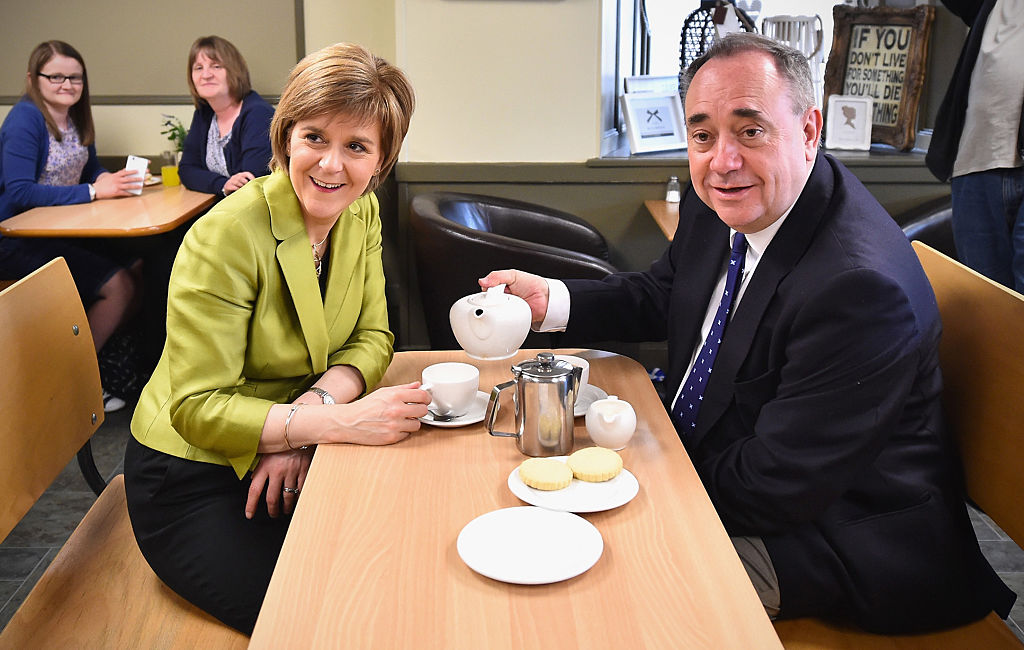The SNP is a coalition that behaves like a megachurch and when the spirit is low, the congregation remembers its schisms. One such departure is defence, because, for all they appear a homogenous rabble of bomb-banners to unsympathetic outsiders, the Scottish Nationalists are quietly but keenly divided on security. The combination of their current political funk and the poisoning of Sergei and Yulia Skripal has forced this into the open.
Nicola Sturgeon’s response to the Salisbury incident surprised some of her opponents and appalled some in her party. Her instinct was to tweet in support of Theresa May’s statement and package of sanctions, including the expulsion of 23 Russian diplomats. While Jeremy Corbyn went out of his way to avoid condemning the Kremlin, Sturgeon insisted:
Sturgeon expanded on this in the Scottish Parliament, telling MSPs:
‘The matter demands a proportionate but very firm response…That is why I support the initial steps that the Prime Minister outlined in the House of Commons. As further action is proposed, we will scrutinise that carefully, as I hope all parties will, and, as the investigation progresses, we will apply the same scrutiny to any emerging evidence. The key point, which I and others made yesterday, is that attacks of this nature simply cannot be allowed to take place on the streets of this country with impunity.’
Even those of us who make a living being disappointed in the First Minister were impressed by her mettle. There was none of the equivocation of Corbyn; Sturgeon is a sceptic of Western power in practice but she broadly accepts the theory. ‘Our streets’ was a nice touch, too. It was, however, out of step with the sweep of opinion in her grassroots. Salisbury is not their streets and Westminster not their government. If you have the stomach for it, have a glance at the Facebook pages popular among SNP members, where the poisoning attack was nothing to do with Scotland – and a false-flag operation anyway.
This stand by some Nationalists is not in vain. It is rewarded by MPs like Douglas Chapman, who told his Twitter followers he was ‘concerned that rumours are circulating to suggest #PortonDown scientists are not able to identify nerve gas as being of Russian manufacture’. Chapman is the SNP’s defence procurement spokesman. He was outdone, though, by Alex Salmond whose commentary on the attack – issued with such raw courage on Russia Today – amounted to a mélange of prevarication, elusion and useful idiocy. Salmond grasps the mindset of those Nationalists who balked at Sturgeon’s statements; he has made a career, in part, by exploiting such impulses in the party and the country at large. Leave well alone. Keep out of next door’s business. Nothing to do with us.
Scotland is a conservative nation in denial and likes to be told its instinct for leaving foreigners to their fate is noble and progressive. Salmond has a knack for making ‘I’m all right, Jack’ sound like ‘give peace a chance’. When he led the SNP to oppose military action against Slobodan Milošević, then lustily piling up the corpses of Albanians in Kosovo, Salmond called Nato’s intervention ‘an act of dubious legality’ and ‘unpardonable folly’. Torpor in the face of ethnic cleansing was redeemed as legal prudence and wise restraint.
So the Salisbury incident is hardly the first rehearsal of these intra-party disagreements. But it is worth noting for the giant thunking wedge it throws into the centre of SNP defence and foreign policy. Sturgeon has the upper echelons and most of the parliamentary groups on her side but Salmond has the bulk of the membership on his. What happens in the event of another referendum on independence? The world is a vastly different place from 2014. Singing in unison on Trident and chucking in some talk about Nordic allies and maritime patrol vessels isn’t going to cut it anymore.
Defence would be at the forefront of a do-over plebiscite and here the Nationalists would have a job on their hands convincing floating voters that an independent Scotland could defend itself through Nato, close cooperation with the UK, and stout resolve against Russian expansionism when the SNP’s own ranks are lukewarm on Nato, sub-zero on the UK, and consider Putin a victim of BBC bias. Half of them want a peaceable but prepared country, not warlike but recognising the benefits and obligations of European security cooperation. The other half, while mouthing bromides to the same, are isolationists at heart and derive their thoughts on conflict and security from a Chomsky primer. It will only get harder to keep this uneasy coalition together.







Comments